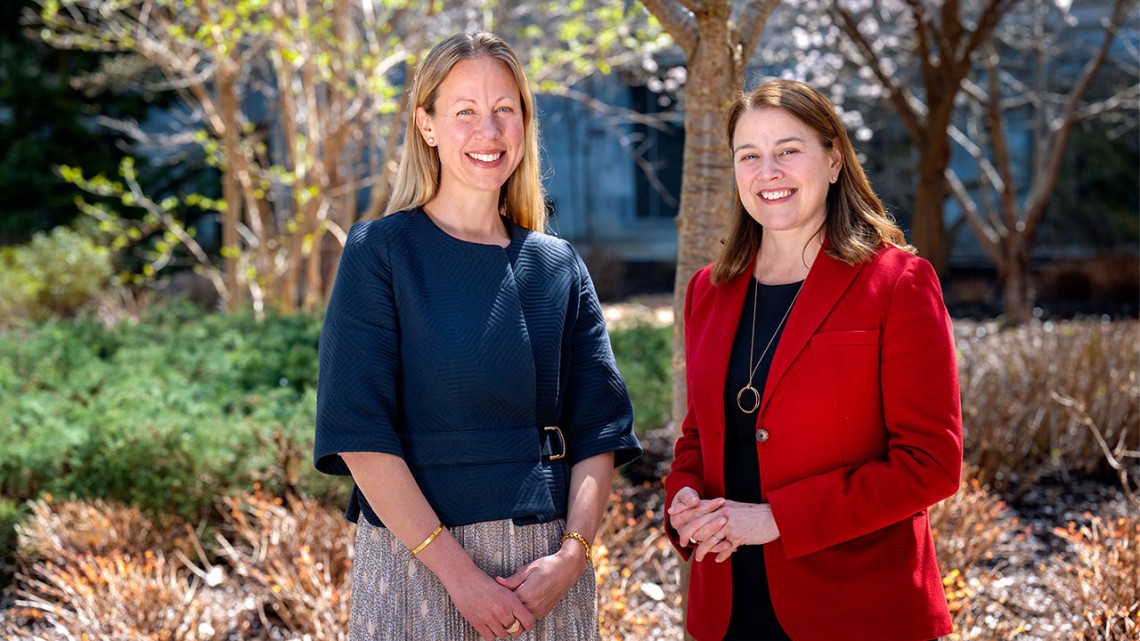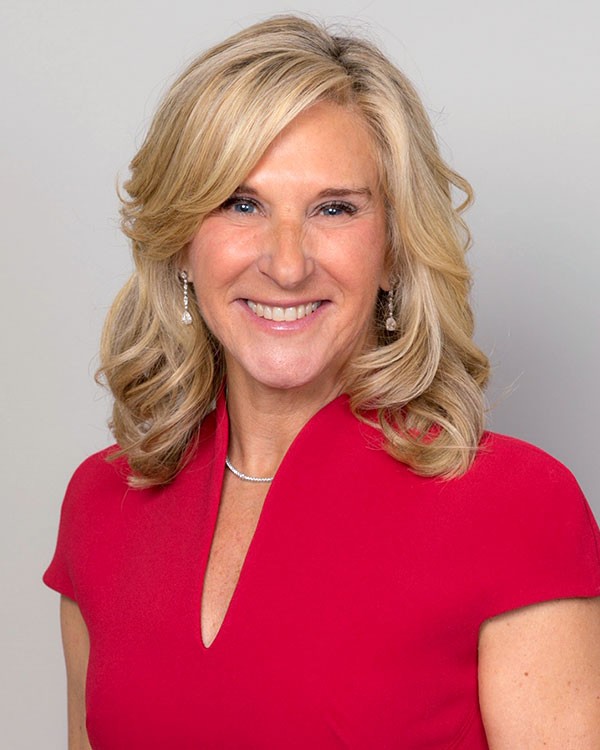
Rachel Beatty Riedl, left, the Einaudi Center’s director and John S. Knight Professor of International Studies and professor in the Department of Government in the College of Arts and Sciences and the Brooks School, and Colleen Barry, Brooks School dean.
Brooks School launches center to combat democratic decline
By Giles Morris
A new center housed at the Cornell Jeb E. Brooks School of Public Policy will bring together leading experts from across the university to tackle the fundamental questions facing democracy around the globe, and serve as a central hub to catalyze research and learning aimed at strengthening democratic institutions and actions.
The Center on Global Democracy (CGD) will be formally launched in July, said Colleen Barry, Brooks School dean.
“Using policy to reverse democratic declines and bolster democratic institutions and practices around the globe connects directly to the Brooks School mission to advance the well-being of all people through the development of new knowledge,” Barry said.
Rachel Beatty Riedl, the John S. Knight Professor of International Studies and professor in the Department of Government in the College of Arts and Sciences and the Brooks School, will serve as the center’s first director, thanks to a $5 million gift from Cornell Board of Trustees Vice Chair Peggy Koenig to endow the role as the Peggy J. Koenig ’78 Director of the Center on Global Democracy.
Koenig, a third-term Cornell trustee who chairs the board’s Executive Committee and co-chairs Cornell’s “To Do the Greatest Good” campaign, said the gift is an opportunity to fund a project that was meaningful to her personally and served the university’s broader goals.
“Democracy is on the decline and autocracy is on the rise throughout the world,” Koenig said. “Cornell and the Brooks School are uniquely positioned to tackle this incredible challenge. With Professor Riedl’s leadership, Cornell will be a hub for building democratic resilience and encouraging our students to be active and engaged global citizens.”
In addition to her three terms as a trustee, Koenig is serving as the inaugural chair of the Brooks School Dean’s Advisory Council.
“With this gift, Peggy has enabled us to launch this new initiative to strengthen democratic institutions and practices with partners across the globe,” Barry said. “I am tremendously grateful for all that Peggy has done to advance critical work at the Brooks School and across Cornell.”
Riedl, who currently serves as director of the Mario Einaudi Center for International Studies, recently identified episodes of democratic decline in nearly 40 countries since 1990 as first author of “Democratic Backsliding, Resilience, and Resistance,” which published Jan. 17 in the journal World Politics. Half of those countries exceeded the wealth threshold above which social scientists have previously believed advanced, industrial democracies could not break down, the study found. Riedl will step down from her role at the Einaudi Center at the end of June.
“Rachel has been a highly collaborative leader of the Einaudi Center and she will bring that same collaborative spirit to her work as inaugural director of the CGD, deepening Cornell’s engagement with issues of democratic resilience during this critical period in global affairs and building partnerships across the university and the world around this work,” said Wendy Wolford, vice provost for international affairs and the Robert A. and Ruth E. Polson Professor of Global Development in the College of Agriculture and Life Sciences.
A key focus of Riedl’s research is the recognition that the most imminent threat to democracy globally comes from autocratic leaders leveraging democratic institutions – election officials, legislatures, courts and the media – to consolidate executive power.
“Powerful interests are using policy and other democratic tools to gradually weaken democracy. If you can identify threats to democracy and respond to them in the early stages, you’re much more likely to be able to resist backsliding,” Riedl said. “If erosion goes too deep and too far, it’s much more difficult to recover.”
The Center on Global Democracy will connect scholars in disciplines including political science, sociology, economics, law, global development, communication, psychology and computer science, who are working on cutting-edge topics using varied methodological approaches and skill sets, Riedl said. By harnessing Cornell’s expertise across disciplines and regions, the center can create a comparative laboratory that will translate research in ways that yield specific policy recommendations and engage directly with policy stakeholders.
The center will function at multiple levels for the university, with priority on: advancing research; developing new curricular and student engagement opportunities; and public policy engagement with practitioners and policymakers. Students will be actively involved in the research agenda, contributing to teams led by faculty as well as developing their own projects.
As the Brooks School prepares for the center’s launch, Barry said the next few months will be dedicated to planning the first year of initiatives and to building strong partnerships within and outside Cornell, including in collaboration with the Einaudi Center. The Reynolds Foundation, established by Tim (MBA ’94) and Caroline Reynolds, and led by Dr. Álvaro Salas Castro (MPA ’14) as president and CEO, has made a significant contribution in the inaugural year of the center, supporting both operations and programming.
Giles Morris is assistant dean for communications in the Cornell Jeb E. Brooks School of Public Policy.
Media Contact
Adam Allington
Get Cornell news delivered right to your inbox.
Subscribe

